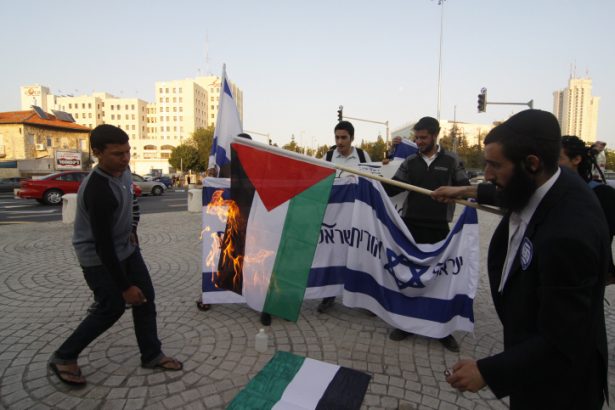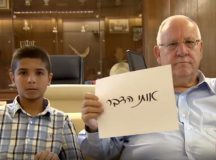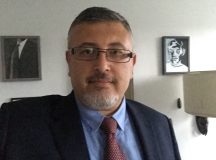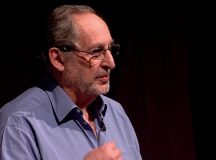While Israel was never the harmonious campfire of legend, it is now an extremely crowded, contested and combustible place, argues Mike Prashker in his book A Place for Us All – Social Cohesion and The Future of Israel. The country needs a mature democratic culture that facilitates greater social cohesion if it is to mediate the profound disagreements between what President Rivlin has called Israel’s ‘four tribes’. Interviewed by Fathom’s Sam Nurding, Prashker sets out what social cohesion means, what conditions promote it, and which initiatives could help it flourish in Israel today. Download a PDF version here.
What is social cohesion?
Samuel Nurding: Your book is titled A Place for Us All – Social Cohesion and The Future of Israel. First, what does ‘social cohesion’ mean?
Mike Prashker: There are various definitions of social cohesion. The Bertelsmann Foundation, which published a report in 2013 on social cohesion, defined it in terms of three domains: social relations, connectedness of citizens to the state, and focus on the common good. The OECD’s definition of social cohesion focuses on social inclusion, social capital [trust between different groups in society] and social mobility. I chose to define the concept in a rather different way – as the characteristics of relations among all of a state’s citizens which provide them with the best prospects for a successful shared future.
That definition emerged through consideration of sensitivities that are, to an extent, Israeli. In Israel, it is not a given that social cohesion must be about all of the state’s citizens. But it must be! We cannot cherry-pick the fellow citizens with whom we wish to be cohesive! In June 2015, President Reuven Rivlin famously spoke about Israel’s ’four tribes’. If only three out of the four tribes are getting along, it is not going to produce a positive trajectory for Israeli social cohesion.
SN: Why did you write the book?
MP: There were five key motivations for writing the book. The first was to bring some more precision to the concept of social cohesion. When a term comes into play and becomes popular, there is always competition over its meaning.
The second is my hope that the striving for greater social cohesion becomes a consensual goal for all Israelis. That it is not only a left-wing or secular issue. Whatever your perspective – Zionist, faith-based, civic, moral or pragmatic – strengthening the fabric of Israeli society should be a consensual goal.
Third, I wrote the book from my own Zionist-Jewish perspective to inject confidence that Israel, as the national homeland for the Jewish people is entirely legitimate, and that as such Israel must and can become ever fairer to all its citizens.
Fourth, I wanted to present a plan of action. If this is what social cohesion means and these are the conditions conducive to its promotion, then this is what we should do in government, society, the media, economy, education and more, for its advancement.
And finally, I aspired to provide much-needed hope that a better shared future for all Israelis is possible, by providing a more positive assessment of the considerable progress already made, along with a sober warning about the clear and present danger to the fabric of Israeli society.
Why is social cohesion relatively low in Israel?
SN: One study you mention, by The Bertelsmann Foundation, placed Israel 28th out of 34 EU and developed states for overall social cohesion between 1989-2012, citing Israelis’ negative attitudes toward diversity, lack of faith in political and social institutions, and very low perception of fairness, as the reasons for the low score. What has changed since 2012, and why do you think Israel is lagging behind in society-building when it has been successful in so many other areas such as technology, military, health, etc?
MP: It’s important to point out that Israel becoming part of this exclusive group of advanced developed states was not a given in 1948. The fact that Israel was part of the study shows that country is doing much better than many people ever expected. All Israelis should be proud of that. But I take your point – Israel does not want to be 28th in social cohesion any more than it wants to be 28th in the development nanotechnology or medical research. So why are we? The first reason is the extremely harsh reality of our founding in 1948 that meant that the need to establish the institutions of a state – building an army, an economy, government etc. – necessarily preceded the work of society building. It is encouraging that today the security establishment, as well as many retired military leaders, say that strengthening the fabric of Israeli society is a national strategic imperative.
Another reason for our lowly position in that table is the respective traumas of the communities that comprise Israeli society. Israel was born in conflict and the pronounced historical separation [not de jure segregation] of Israel’s 80 per cent Jewish and 20 per cent Arab communities has still not been overcome. The continuing conflict and occupation have a corrosive effect on the desire of the majority Jewish population and minority Arab population to live together.
SN: How does the lack of a peace between Israel and the Palestinians impact Israel’s own social cohesion?
MP: A large majority of Arab citizens of Israel also self-identify as Palestinian and find themselves torn between their state and their people. So the conflict is obviously extremely damaging to Israeli social cohesion. As founding-director of the NGO Merchavim, which promotes social cohesion on the basis of shared citizenship in Israel, I was privileged to work with dozens of Arab- and Jewish-Israeli staff members who care deeply about each other. But sadly, up until today, as throughout Israel’s history, when the children of some Merchavim staff are putting their lives on the line for Israel facing up against the families of other Merchavim staff, the strain even between close friends is extreme.
SN: What are the distinct challenges facing Israel in promoting social cohesion?
MP: As I have said, one challenge is the ongoing conflict. Another is the internal disagreement over the primary sources of authority. Who’s in charge, the ‘Creator’ or the ‘Knesset’? If there is an order to evacuate settlements, then some Orthodox soldiers will find themselves caught between their commanding officers and their Rabbis, and that is an unenviable place to be.
Another challenge, distinct but not unique, is Israel’s particular definition as the national homeland of the Jewish people. This definition provides a natural sense of entitlement and belonging for Israel’s 80 per cent Jewish majority and can sideline a meaningful sense of belonging for Israel’s Arab minority. In the book I give two examples to support my claim that there is no necessary connection between the particular identity of the state and its potential fairness to all its citizens. The USA is a state for all its citizens but has been historically unfair to African-Americans and Native Americans. The UK is historically Anglican, but currently is by many measures very fair to the Jewish minority and less so to the Anglican-majority in the social and economic peripheries. (This of course notwithstanding the current concerns about antisemitism in the Labour Party.) These examples demonstrate there is no necessary relationship between the particular definition of a state and its potential to be more or less fair to its minorities.
But there is undoubtedly a gravitational pull. When a state has a particular national identity, it has to work especially hard to be fair to all its citizens. If ‘Israeli’ is frequently understood to mean ‘Jewish’, and if people continually make category errors – for example saying ‘Israelis and Arabs’ when referring to Jewish and Arab citizens of Israel – then we perpetuate the sense that too many Arab citizens of Israel have, of being on the periphery and inevitably excluded. Unfortunately, the recently legislated Nation-State Law has made it practically and symbolically harder to persuade Israel’s Arab citizens that they can ever be and feel fully included. It has unnecessarily widened the gap between being a citizen formally and substantively feeling like a citizen. As a result, it has unfortunately set back progress towards making Israeli society more cohesive and Israel stronger, while serving no constructive Jewish-Zionist or pragmatic purpose.
A further challenge is the unresolved borders. Agreements on borders are one of the eight conditions I propose as conducive to more cohesive societies. It is true that not all border disputes present strategic challenges to the promotion of social cohesion. But when citizens are divided over the border dispute, and when ‘non-citizen stakeholder communities,’ in Israel’s case half of world Jewry and millions of Palestinians living within those disputed borders, are impacted physically and emotionally, this has grave implications for the cultivation of social cohesion.
The future of Jerusalem is another big challenge, one all too often ignored by Israel’s civil society as it is so dauntingly complex. Jerusalem evokes profound religious convictions and emotions among literally billions of Christians and Muslims, as well as Jews everywhere. Ultimately, the progress we make in improving relations between all citizens of Israel is likely to be akin to the progress we make in learning to live together decently in Jerusalem. And in the spirit of optimism in which the work of inclusive society-building must be conducted Jerusalem can be and must become a beacon of hope showing how we can shape a better future together.
From ‘Four Tribes’ to Social Cohesion
SN: You talk about President Rivlin’s ‘four tribes’ metaphor (Ultra-Orthodox, Arab-Palestinian, National Religious, Secular) to describe Israel’s social make-up, and you explain how each can make a convincing case for being the most misunderstood and unappreciated tribe. You point out that each tribe perceives the other as a threat to their identity and/or physical well-being. How can Israel move from a country of ‘tribes’ to one that has a healthy level of social cohesion?
MP: President Rivlin has done every Israeli and all who care about Israel’s future a great service by providing that extremely accessible metaphor. Because it references Israel’s four separate school streams, many Israelis quickly recognised that they do indeed belong to one of those four tribes. In the book I identify eight conditions that are conducive to the promotion of more healthily cohesive societies.
First, a ‘mature’ democratic culture as opposed to what I term an ‘adolescent’ culture – which tends to think in binary terms of black and white. A more mature culture is nuanced, grasping that democracy is not only about majority rule but also protecting minority rights; that democracy is not primarily a mechanism to pound different groups into submission, but a mind set by which citizens can accommodate their profound disagreements. In Israel (and clearly not only in Israel) that requires a huge amount of democracy-learning, from kindergarten through to high school – and apparently life-long learning and practise.
The second condition – broadening much of the current social cohesion conversation – is sustainable relations between all citizens and ‘major non-citizen stakeholder’ communities. No state in the 21st century is an Island. For example, the future of all British citizens is intimately related to Commonwealth countries and the wider Muslim world. For Israel, there are two major non-citizen stakeholder communities: rather more than half of the world’s Jews who are citizens of countries other than Israel and the majority of the world’s Palestinians – about four million of whom currently live stateless and under various degrees of Israeli control in the West Bank, East Jerusalem and Gaza.
The third condition, which I referred to earlier, is agreement on borders in certain geo-political conditions intimately impacting large numbers of major non-citizen stake-holder communities.
The forth condition is prosperity alongside reduced economic gaps. A large body of research, including the OECD and Bertelsmann studies I referred to earlier, indicate that while more prosperous countries tend to have higher levels of social cohesion, this is intimately related to the reduction of income inequality. The 2015 OECD income inequality index confirmed what the great majority of Israelis feel and experience. It’s no coincidence that a review of comparative levels of social cohesion alongside a review of comparative levels of income inequality on the GINI measure, reveal that Israel – together with the likes of the US, Turkey and Mexico – are towards the wrong end of both scales. We need to acknowledge in Israel, as elsewhere, that the greater the economic inequality the lower the social cohesion, and visa-versa.
The fifth is trust among citizens of different communities; what American sociologist Robert Putnam called ‘social capital’. As you gathered from the book, research and experience reveal that trust between Israel’s different communities (President Rivlin’s ‘tribes’) is currently very low. Ironically and paradoxically, it is my long experience that all Israeli groups feel threatened, though none perceive themselves to be threatening.
The sixth condition is trust in trust-worthy state institutions. A mature democracy is populated by citizens not subjects. Citizenship in mature democracies requires scepticism, vigilance and critical engagement, not blind trust in state institutions. It is precisely through critical civic activism that state institutions are made and kept trustworthy.
The seventh condition conducive to the promotion of more cohesive societies is economic, material and symbolic belonging. These three aspects are critical and inseparable. I have been involved in research that shows many Israelis feel themselves to be on the periphery of Israeli identity. To overcome this, we certainly need higher levels of both economic and material belonging (high levels of decently remunerated employment, roads, water supply, electricity etc.) for Israelis of all backgrounds. But just as critically we need to cultivate higher levels of symbolic belonging, so that when Israel’s leaders say ‘Israeli’, they are understood to be referring to all citizens of Israel, Jewish and Arab equally.
The final condition is a shared sense of common civic purpose. When – as is currently the case – one Israeli tribe’s dream is another tribe’s nightmare, it is exceedingly dangerous. In Israel, this plays out in different ways: the idea of closing all stores on Shabbat is at once a dream and a nightmare; the two-state solution is one tribe’s dream and another’s nightmare, and so on. Twenty years work at Merchavim have confirmed time and again that the best way to establish a shared sense of common civic purpose is based on fairness, which has broad universal appeal. This together with the cultivation of a mature democratic culture that legitimises and accommodates the profound disagreements that characterise Israeli society and to different extents, all modern states.
SN: Following on from this last point, one gets the sense by reading your book that for more meaningful shared Israeli citizenship and a higher level of social cohesion, each tribe has to compromise. Yet, over the last decade each tribe seems to be adopting more maximalist language. What can be done by the government and / or civil society to reverse this trend?
MP: One stubborn myth I try to debunk in the book is the idea that all Israelis once got on famously, but now do not. Incidentally, the comprehensive Bertelsmann Foundation findings found levels of social cohesion remaining relatively stable in Israel over recent decades, despite growing pressures from all communities to compete in the public space and in the face of the pressures exerted by divisive political discourse and social media.
One of the things I tried to do in the book is to look at the historical development of relations between the different groups that make up Israeli society. In the early decades Mizrachi Jews lived disproportionately in developments towns in the peripheries, Arab citizens lived in their isolated villages and towns in the central triangle and in the north, Ashkenazi Jews tended to live in homogeneous collective settlements and more central urban areas and the ultra-Orthodox lived in their own insular communities. So, without telephones, with limited transport infrastructure and opportunities to travel with limited TV and no social media – and of course with far fewer Israelis (just over half a million in 1948 as opposed to close to nine million today – the realistic opportunities for the different tribes to come into contact, let alone clash, were extremely limited. However, over time and as the population and opportunities for mobility grew, the aspirations of each community to integrate within the mainstream Israeli society also happily increased. Rising aspirations and such expanded horizons – however welcome – have inevitably caused great disruption. Israel’s tribes now need to come to terms with the reality that no one tribe is going to have everything its own way. With accommodation imperative, the identification of shared values, identities and interests is critical. This urgently requires the development of a common civic language relatively comfortable for Israelis of all backgrounds and a more ‘mature’ democratic culture.
Related, the second founding myth I have tried to address in the book is the idea that Israel was once a beacon of liberal democracy. True, Israel was certainly a remarkable democratic achievement from day one. The fact that it was even established as a democracy wasn’t a given. Keeping in mind the trauma and bloody circumstances surrounding Israel’s establishment and the overwhelmingly non-democratic backgrounds of its founders, the democratic institutions and mechanisms quickly established were never a given. It is noteworthy and should be a source of pride that there were three Arab members in the first Knesset, and that Israeli women had the vote 20 years before their Swiss counterparts.
But Israel never was nor could it have been a mature democracy – there was one power elite that, while it took impressive responsibility for state-building, also dictated terms for all other groups. Today, while Israel is clearly facing a democratic crisis, that is not the result of terminal decline but rather the result of unprecedented numbers of Israelis from all backgrounds and ‘tribes’ asserting ‘first-class’ citizenship. What used to be portrayed as a harmonious, mythical campfire has now become an extremely crowded, contested and combustible space. What is required for the first time in Israel’s history is a mature democratic culture that can accommodate our profound disagreements, mitigate the unprecedented friction and allow for the crafting of a shared civic future. My long experience has persuaded me that an overwhelming majority of Israelis of all backgrounds are ready to focus on clarifying and expanding possible areas of agreement. But for this to happen we do have to stop pandering to and being beholden to the most extreme voices. In the book, one of the 19 policy recommendations I make to promote Israel’s social cohesion is the establishment of a Shared Citizenship National Holiday for all Israeli citizens, in addition to Independence Day. But for that to happen we must stop deferring to those who want to erect ever-higher barriers between groups. We need a consensual vision that dignifies and includes all citizens. But as is happening around the democratic world, too many Israeli politicians – encouraged by the media – pander to their respective bases, exploiting and fanning ‘tribal’ instincts and fears.
The reinforcement of Israel’s legitimate identity as National Homeland of the Jewish People, replete with our particular symbols, requires the adoption and implementation of ever fairer policies and practices that provide all Israelis a meaningful sense of belonging. For better and for worse, the meaning of state symbols can change dramatically over time. When I was growing up in the UK in the 1970s I experienced the Union Jack (an amalgam of Christian symbols) as increasingly ‘belonging’ to the National Front. Fast-forward to black British Muslim immigrant Mo Farah wrapping that same flag around him at the London Olympics in 2012. Now that very same flag symbolised inclusiveness for Brits of all backgrounds. With this, as the current wording of the Israeli national anthem clearly excludes Arab citizens, Israel should be confident enough to bring Hatikvah in line with the words of the Declaration of Independence by adding a new verse to dignify and embrace all Israel’s citizens – over 20 per cent of whom possess no ‘Jewish soul’.
Can a ‘Jewish State’ be socially cohesive for non-Jews?
SN: Does Israel need a new definition of statehood in order to build a genuinely shared Israeli citizenship?
MP: I’ve spent 20 years having this conversation with Arab citizens of Israel. I understand their scepticism. I see why they fear that Israel as so-defined will never be fair to them or feel entirely like home. After all, over 70 years as Arab citizens in the national homeland of the Jewish people, they have experienced what successive Israeli governments have now acknowledged to be high and enduring levels of discrimination. But I also say to those Arab citizens that, in a world of nation states, I believe in the right of the Jewish People to our national homeland, aspiring to ever-greater fairness for all its citizens, alongside a national homeland for the Palestinian people.
How to Boost Social Cohesion in Israel
SN: What ideas do you have for boosting social cohesion in Israel?
MP: The final section of the book proposes 19 social cohesion initiatives in six areas: Awareness, Government and Economy, Media, Education, Jerusalem and Civil Society.
One of the initiatives I have already mentioned is the establishment of a ‘Shared Citizenship’ National Holiday in addition to Independence Day. I call on civil society to work with the government to consensually design such a day; when Israelis from all ‘tribes’ can celebrate our shared citizenship together. In the area of education, the systematic expansion of initiatives to integrate teachers of all backgrounds in Israel’s four separate school streams offers great promise for educational standards, economic advancement, symbolic belonging and trust between communities; all key to the promotion of higher levels of social cohesion, I also propose working with the media to encourage the making of quality programming in which young Israelis from all backgrounds struggle together with the dramatic issues inherent in creating a better shared future. There have already been creative models of commercial and philanthropic partnerships to produce high quality entertainment, like the series Arab Labour, which helped elevate the issue of Jewish-Arab relations towards the mainstream.
Of the 19 initiatives, seven propose educational strategies designed to address the fact that young Israelis learn in four separate school streams which is a severe structural barrier to shared citizenship education promoting social cohesion. As these separate streams are unfortunately a given for the foreseeable future, I propose the establishment of shared learning spaces to supplement them. As shared facilities, these centres could provide high-quality educational opportunities in subjects like science, music and sport, where these opportunities are frequently lacking. This would allow pupils from the separate streams to learn together, taught by teachers of different backgrounds, so providing a strategically important inclusive setting for the promotion of social cohesion through education.
I moved to Israel from England as a young man 40 years ago. Looking back, and despite all the challenges and setbacks, it could not be clearer to me that Israel is not only much stronger, but also more open, inclusive and democratic than when I arrived. For the first time, Israelis of all backgrounds are making their voices heard and aspiring to achieve full inclusion and first class citizenship for themselves and their children. This is excellent news, but it is also a disruptive and dangerous moment because Israel’s previously inward-looking ‘tribes’ are clashing as never before.
But as I concluded in the book, ‘if we Israelis, and all those who care about Israel’s future, work on the promotion of healthier levels of social cohesion as determinedly and creatively as former generations worked on state-building’ the results of this endeavour can be spectacular; and Israel really will become the Light Unto the Nations in which we must always believe and towards which we must always strive.




































